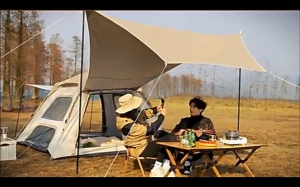News Center+ 查看更多
News Center
+ 查看更多
Pitching Tents Through Time: The Rich History of Camping Adventures+ 查看更多
Pitching Tents Through Time: The Rich History of Camping Adventures
+ 查看更多
Date:2024-04-02
Camping, as we know it today—a leisure activity enjoyed by millions around the globe—is a relatively recent development in the long tapestry of human history. However, the act of camping is as old as humanity itself. This article delves into the fascinating evolution of camping, tracing its roots from a necessity for survival to a modern form of recreation and connection with nature.
Primitive Beginnings: Survival's Encampment
The earliest humans were nomadic hunters and gatherers who camped out of sheer necessity. Their temporary shelters were rudimentary structures made of animal hides, sticks, stones, or whatever materials were at hand. These encampments were not for leisure; they were essential for survival, providing protection from predators and harsh weather conditions.
As civilizations advanced, so did the complexity of these temporary dwellings. The Roman Empire, for instance, is known for its military camps, which were remarkably sophisticated in design and function, reflecting the might and organization of the legions.
Pastoral Pastimes: Camping's Aristocratic Roots
Fast forward to the 17th and 18th centuries, when camping took on a different hue within the European aristocracy. 'Pastoral camping’ was seen as an opportunity for the elite to temporarily escape the confines of court life and return to a simpler existence amidst nature—albeit one still steeped in luxury.
These outdoor retreats involved elaborate tents and accommodations, often resembling mobile palaces more than the humble abodes of their hunter-gatherer predecessors. This romanticized version of camping influenced literature and art, symbolizing an idealized return to the pastoral landscapes of yore.
Transatlantic Transition: Camping for Health and Recreation
The notion of camping for pleasure truly began to take shape in the 19th century. Influencers like Thomas Hiram Holding in the United Kingdom, regarded as the father of modern recreational camping, began promoting the activity as beneficial for health and spirit. His experiences crossing the American prairies with early settlers inspired him to write "The Camper's Handbook" in 1908, laying the groundwork for recreational camping as we recognize it.
Across the pond in the United States, similar trends were emerging. The transcendentalist movement, with figures such as Henry David Thoreau and Ralph Waldo Emerson, extolled the virtues of living simply and in harmony with nature. Thoreau's famous work, "Walden," is often cited as inspiring the camping movement in North America.
Organized Outdoors: The Birth of Camping Groups
The late 19th and early 20th centuries saw the formation of various camping and outdoor associations. The Boy Scouts and Girl Scouts, founded by Robert Baden-Powell, introduced camping as a key element of youth education and character-building. Meanwhile, organizations like the YMCA and the Sierra Club in the U.S. promoted camping to adults as a way to commune with nature and preserve natural spaces.
Modern Movements: Camping Today
Today, camping has evolved into a versatile activity accessible to all. Advances in technology and gear have transformed the experience, allowing campers to choose their level of comfort—from ultralight backpacking to fully-equipped RVs and glamping with amenities that rival five-star hotels.
Sustainable Shifts: Eco-Conscious Camping
In response to environmental concerns, there's been a surge in eco-conscious camping practices and gear designed to minimize impact on the natural world. Campers are encouraged to follow principles like "Leave No Trace," ensuring the great outdoors remains unspoiled for future generations.
A Timeless Tradition
From ancient reliance on natural shelters to the contemporary quest for disconnection and relaxation, camping has remained a testament to humanity's enduring bond with the wilderness. It reflects our innate desire to explore, connect, and find solace beneath the open sky—a pursuit that, despite its long history, continues to evolve and thrive in the hearts of adventurers worldwide.
As we pitch our tents and unfurl our sleeping bags, we partake in an age-old ritual that rekindles something primal within us. And as we gaze upon the stars or listen to the crackle of the campfire, we're reminded that, though times may change, the allure of camping adventures remains as potent as ever.

